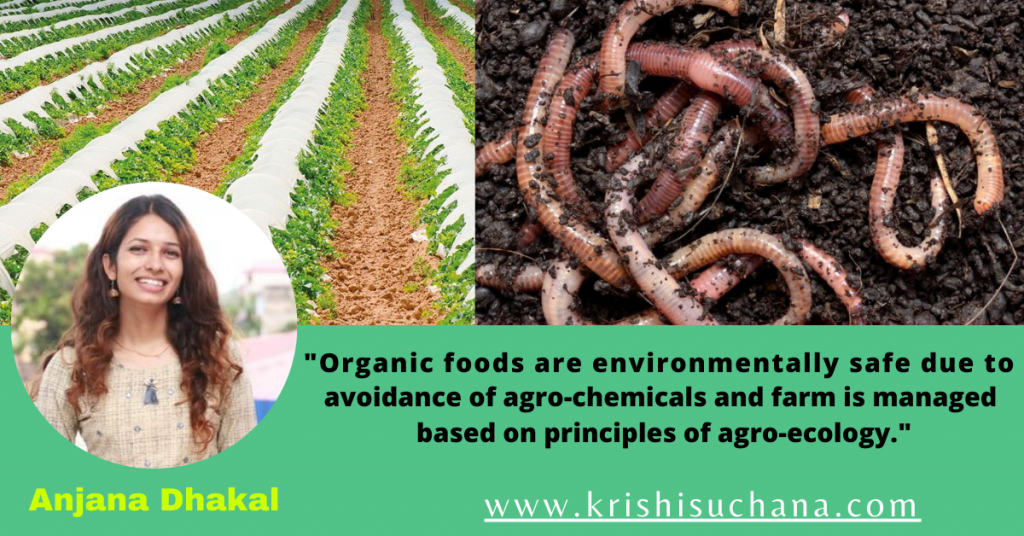Why Organic Farming ?

Food choice and consumption are dynamic and it is influenced by cultural and socio-affective factors as well as information available about the food. Interest on organic food is seen remarkably increased as it is believed to be healthy and environmentally sustainable. Organic agriculture was first appeared as one of the priority sectors in Nepalese agriculture since the 10th Five Years Plan. Organic agriculture was put into light of promotion in the 10th five-year plan (2002-2007) of the Government of Nepal (NPC, 2003).
People are being more conscious about the food they take may be because of increased awareness and educational level also it has some role of media too. 175 countries in the world have already adopted organic agriculture. Developing countries like Nepal which have low economic growth is seen to have nascent market of organic food.
Organic farming is a technique that maintains, enhances and sustains the ecosystem through natural cycling and self-regulation of natural resources.
Hence, organic farming can be defined as an agricultural system that promotes environmentally, socially and economically sound production of food, fiber timber, etc. In Organic agriculture soil fertility is seen as the key to successful production, where farmers aim to maintain and improve long term fertility and sustainability of farm land. Also, it aims to optimize quality of agro-ecosystem and produce crop with a high nutritional value.
Organic foods are environmentally safe due to avoidance of agro-chemicals and farm is managed based on principles of agro-ecology. Organic farming facilitates a healthy agricultural atmosphere by balancing a better soil health, providing a pace of gradual increase in production over time, maintaining a minimal or zero pesticide residue on agricultural produces and thus ensuring national as well as global food and nutritional security.
Pesticides can cause acute effects like stinging eyes, rashes, blisters, blindness, nausea, dizziness, diarrhea, as well as chronic adverse effects like cancers, birth defects, reproductive harm, neurological and developmental toxicity, immunotoxicity, and disruption of the endocrine system. Organic farming uses carbon-based fertilizers and biological pest control and does not use synthetic fertilizers and it is cost effective too. Conservation of living organisms at ecosystem, species and genetic level is done by organic farming. So it promotes biodiversity conservation. Safe and nutritious foods are provided to the consumer by organic growers.
Demands for organic products are increasing with increase in education and awareness about health, purchasing power, and the willingness to pay for healthy foods among consumers also high value of organic products is well known. Nepal has great export potential of high quality organic products if managed and certified. There is high profitability as it has low cost of production and higher market price. Because of sustainable improvement in soil fertility and productivity it helps in food security. Agriculture affects climate change by contributing about twenty percent of global greenhouse gas emissions. Sustainable agriculture with environmentally safe food production and climate resilience quality is a need at present.
Organic agriculture has long been appreciated for its ecological soundness, environmental safety and productivity with synergistic benefits including adaptation to climate change and mitigating it. Organic agriculture sequesters carbon in the soil and is likely to emit less CO2 and N2O. In addition, it promotes, manages and enhances biodiversity, which offers more beneficial interactions among the components of agriculture and enhances its sustainability.
Thus, in agrarian countries like Nepal, where integrated crop-livestock farming system is still in practiced in most of the part of country, organic agriculture is a very good option. Increasing use of agrochemicals, higher production cost and deterioration of ecosystem health have advocated the need to change the traditional and external input using agriculture towards safe and sustainable organic production. Government needs to formulate a proper plan and approach is necessary in the policy level to facilitate the organic agriculture to the portal of food security.
The government should have strategies, defined objectives, easy certification mechanisms, reliable market and premium price of organic products, defined critical zones and hotspots that need organic system as intervention. Adoption of these strategies can lead to a pathway of food and nutritional security and sustainable agriculture.
Writer: Anjana Dhakal (College: Institute of Agriculture and Animal Science)

